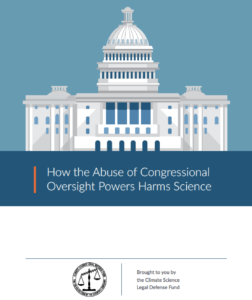New Report: How the Abuse of Congressional Oversight Powers Harms Science
 Today we published “How the Abuse of Congressional Oversight Powers Harms Science,” a report on the damaging occasions where Congress abuses its power over science.
Today we published “How the Abuse of Congressional Oversight Powers Harms Science,” a report on the damaging occasions where Congress abuses its power over science.
The 2020 election results are heartening in many ways: The record turnout, increasing numbers of scientists running for office, and, of course, the election of a pro-science presidential administration.
But many challenges remain, including long-standing structural issues in government that worsened under the Trump administration. In particular, Congress has a history of anti-science actions, both during the Trump administration and in the years prior.
Now, with the prospect of a divided government, Congress is poised to have greater importance in 2021 and beyond. Yet, there are still major issues with how Congress treats science, especially its misuse of congressional oversight powers. As a result, its ability to advance needed climate and environmental policies may be farther away than we hoped.
Overstepping Boundaries
Our report describes how, in numerous instances, Congress members and their committees have overstepped their boundaries, abused their authority, and wasted taxpayer dollars attacking science and scientists. This misuse of congressional investigatory power undermines committees’ essential oversight authority, distracts from Congress’s crucial pro-science work, contributes to false narratives about climate science and other contentious fields, and endangers scientists.
The report provides recommendations on how to defend against the misuse of congressional oversight powers and better protect science.
The recent election highlights the need for these reforms. Sen. James Inhofe (R-OK) won his re-election bid. In 2015, he famously brought a snowball to the Senate floor to illustrate his claims that climate change is a hoax. Inhofe also used his platform on the Senate Committee on Environment and Public Works to call for criminal investigations of climate scientists following the 2009 manufactured scandal known as “Climategate.”
Rep. Darrell Issa (R-CA) was also re-elected; he’s issued record-breaking numbers of subpoenas as part of an “endless pursuit of scandal” and whose views on climate change don’t reflect scientific reality. But it’s not just long-time Congress members like Inhofe and Issa who threaten science. First-time, young Representative-elect Madison Cawthorn (R-NC) has falsely stated that humans’ effect on the climate is “pretty minimal.”
Another new member of Congress, Senator-elect Matt Rosendale (R-MT), has claimed that “climate change is another example of the government trying to control the people.” Most famously, Representative-elect Marjorie Taylor Greene (R-GA) is a vocal supporter of the QAnon conspiracy theory and who rejects mask-wearing during the pandemic, among other sound science. So it appears that rejection of science will continue—by both old and new members—into the next Congressional term.
Damage to the Scientific Endeavor
Our research shows that abuse of Congressional powers is exceptionally harmful to the scientific endeavor. Investigations based on unfounded or fabricated claims have led to harassment of scientific agencies and individual scientists.
These misinformation campaigns often damage scientists’ professional reputations, and the time required to respond to such inquiries takes time away from their work. The investigations have a chilling effect on climate and other types of research and create doubt around scientific findings that may save lives.
Protecting Science
As we head into the 117th Congress, mired in a global pandemic and with time running out on addressing climate change, we must ensure that Congress’s valuable and powerful work is done within a framework that protects the scientific endeavor.
To help with this transition, our report outlines reform proposals, benchmarks to evaluate Congressional actions, and opportunities for the scientific community to protect scientists.
And on an individual level, we encourage researchers who want to engage in Congressional policymaking to read our guide to advocating for science without violating anti-lobbying laws.
Remember, scientists with legal questions or concerns can contact us for a free, confidential consultation: write to lawyer@csldf.org.